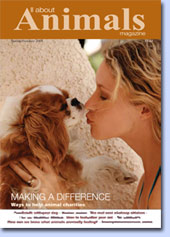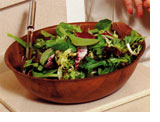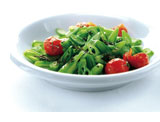- All About Animals
- The magazine for animal lovers.

- For a complimentary copy please telephone 0870 2406871
- Email the Editor

- Write with your opinion on the magazine and life in general after retirement. Click here.
- Register your vote
- Should workers be encouraged by their employers to stay on after retirement?

Nutrition and Health
Eating a healthy diet
So much is written nowadays about eating healthily that the consumer can easily become overwhelmed with the unnecessarily detailed and sometimes contradictory advice given. It's easy to form the impression that sound nutrition is complex. It isn't. In reality, sticking to a few basic principles should ensure you maintain good dietary habits.
Possibly the most important is variety; try to eat as diverse as diet as possible within the parameters of your exclusions. Avoid coming to rely on any one 'safe' food which provides only a limited range of nutrients; over-consumption can also increase your risk of becoming intolerant to a food.
 How you eat is vital too. Take your time - when you're selecting food, cooking it and most importantly eating it. Eat when you're calm and relaxed and can focus on your meal, not when you're rushed or anxious or distracted, when mistakes and oversights are more likely. Remain quietly vigilant and on guard - always. Take care not to become complacent about eating habits - continue to check ingredients and monitor your diet.
How you eat is vital too. Take your time - when you're selecting food, cooking it and most importantly eating it. Eat when you're calm and relaxed and can focus on your meal, not when you're rushed or anxious or distracted, when mistakes and oversights are more likely. Remain quietly vigilant and on guard - always. Take care not to become complacent about eating habits - continue to check ingredients and monitor your diet.
Also, don't skip meals, especially breakfast - you'll experience uncomfortable fluctuations in energy and blood sugar levels and you'll be more vulnerable to casual snacking and grabbing possibly unsafe convenience foods on the go. Plan ahead, and always have healthy and safe foods to hand should you be caught short and peckish.
And remember; just because you have a food allergy doesn't mean you can't be passionate about food. Learn to cook new dishes. Interest yourself in food news and culinary innovations. Live to eat; don't eat to live.
Essential foods
Several good groups are key to your diet.
Complex carbohydrates
These include all grains, and the foods based on them, such as pastas, breads and cereal products. Potatoes also fall into this category. Roughly eight to ten daily servings are recommended to ensure adequate intake of slow energy-releasing carbohydrates and of fibre. A slice of bread, an egg-sized potato, three tablespoons of cereal and two heaped tablespoons of rice count as a serving each.
Protein Foods
Two to three servings of either meat, fish, eggs, beans, nuts or seeds are advised. A portion is equivalent to 100g of meat or fish, two eggs, three tablespoons of beans or a handful of nuts and seeds.
 Fruit and vegetables
Fruit and vegetables
As these are essential sources of carbohydrates, fibre, vitamins, minerals and antioxidant chemicals, you should aim to consume at least five portions daily, preferably more. A handful of berries, and apple, a banana, three tablespoons of peas or lentils, and a side salad are each roughly equivalent to one portion.
Dairy foods
While not strictly essential, two or three servings of either milk, yoghurt or cheese are recommended by dietitians - provided of course you don't have a dairy allergy. A matchbox-sized chunk of cheese, a small pot of yoghurt or a small glass of milk each provide a serving.
Water
Two litres daily is the often-quoted figure to which we should supposedly all aspire, but the quantity depends on so many different factors - the size of the individual, the amount of activity undertaken, the temperature and environment - that it's misleading to generalise.
A good barameter of healthy and adequate hydration is the colour of your urine. Too dark signifies you may lack fluids, so aim to drink enough to keep your pee straw-coloured. Water itself is the best hydrator, but fruit juices, squashes, sodas and milk all contain mostly water and count towards your quota. As do, within reason, teas, coffees and colas - the dehydrating effects of the caffeine in these drinks being absurdly exaggerated by many complementary therapists, but negligible in reality. Alcoholic drinks, which dehydrate heavily, certainly do not count.
Non-essential Foods
In moderation, other foods have their place in the context of a healthy diet, but take care not to overindulge.
Caffeine
Moderate caffeine consumption is safe for most people and perhaps even beneficial to asthmatics, but avoid drinking more than three to four cups of coffee daily in order to stay within recommended guidelines, and remember that black and green teas, cola, cocoa and chocolate products, as well as come painkillers, contain caffeine.
 Sugar
Sugar
Cakes, biscuits, pastries, chocolate bars, sweets - most of us love occasional treats and they're important for your psychological health, especially if you're feeling down about dietary limitations. Eat sugar sparingly, though - no more than 10 per cent of your daily calories should come from sugar, which is roughly equivalent to 50g or twelve level teaspoons. Read labels carefully for added sugars.
Alcohol
Moderate alcohol consumption - up to three units a day - is generally considered OK. The universal health risks of excessive alcohol consumption aside, as a food-allergic you need to take extra care as drinking can reduce your vigilance and dull your senses and responses, leaving you more liable to let your guard slip, thoughtlessly consumer a reactive food and also delay in recognising and treating symptoms.
Convenience food and 'bad' fats
Although fat intake has no obvious direct relevance to food allergic people, for other health reasons it's wide to limit your intake of junk foods and saturated fats, typically found in rich cuts of meat, dairy products such as butter and cream, and any number of desserts and sweet products.
Trans fats are a particular class of fats manufactured during hydrogenation - a process which converts liquid vegetable oils into solid fats and margarines. Many researchers consider them unhealthier than saturated fats. Typically, trans fats are found in pastries, cakes, biscuits, convenience meat products such as pies and take-away foods. Some manufacturers have now removed trans fats from their margarines. Of course, some fats are needed in the diet, and unsaturated fats - found in fish, nuts, seeds, avocados and vegetable oils such as olive oils - are best.
Free-from foods
These have their place, and can be very useful, but they may contain high levels of refined carbohydrates, fats and additives. Wheat-free products especially are worth scrutinizing. Use modestly, and ask yourself whether the product is a good food in its own right. Would you eat it if you weren't suffering from food allergy?
 Organic food
Organic food
There is some evidence that organic food is healthier than non-organic, but the advantage may be marginal. In those with oral allergies to fruit and vegetables, symptoms when eating organic versions may be milder because it's possible that pesticides used on non-organic produce cause plants to manufacture greater quantities of 'defensive' allergens.
Supplementation
In certain circumstances, nutritional supplements may be suggested or advised - but take your cue from our doctor or dietitian. Avoid supplementing without specialist advice, never assume you can compensate for omitted foods with vitamin pills and don't use supplements as substitutes for skipped meals. Always verify
supplements are allergen-free.
An extract from 'Living with Food Allergy' by Alex Gazzola by kind permission of Sheldon Press.
